Join Prof Mark Button and Dr Branislav Hock, authors of the newly published book: ‘Economic Crime: From Conception to Response’ for a discussion and a reflection on the most important problems associated with economic crime. Fraud, corruption, bribery, money laundering, price-fixing cartels and intellectual property crimes pursued typically for financial and professional gain, have devastating consequences for the prosperity of economic life. Too often an effective response to economic crime is limited by institutional, disciplinary, and cultural barriers. Combining different disciplinary perspectives, being it criminology, law, economics, accountancy, security, business management, computer science, and psychology, and involving various policing actors, such as states, companies, banks, NGOs, and media, should become the new reality of solving economic crime challenges.
Transcription
Robert Bateman:
Hello and welcome back to FinCrime Global. I’m Robert Bateman, head of content here at GLC World Forums and your anchor for today. Many thanks for joining us, and a big thanks to our sponsors, Blackdot, BioCatch, and TruNarrative for supporting this event, and a big thanks for all your questions and interactions. It’s really helpful to have those for panelists and speakers to respond to. Coming up next, we have an interview, a fireside chat between Dr. Branislav Hock, who is senior lecturer in economic crime at the University of Portsmouth, and Mark Button, who is director at the counter fraud service, and the University of Portsmouth. They’re going to be discussing the themes arising from Dr. Hock’s new book, Economic Crime From Conception to Response. I’ll hand it over to you both now.
Branislav Hock:
Thank you very much, and this is a joint effort. The book’s first author is Professor Mark Button. [inaudible 00:02:08], and today, the next 30 minutes or so, we will be discussing some of the key premises of the book, but dear colleagues, you are more than welcome to send your questions as we go, and you’ll hear us with the [inaudible 00:02:23] of the program, so we will be happy to address any questions associated with economic crime. First, please allow me to start with a short introduction, what the book is about, and then we will develop the discussion with Professor Button. This book is the first attempt to establish economic crime as a new subdiscipline of criminology.
Branislav Hock:
We can see if fraud, corruption, bribery, money laundering, bribe fixing, cartels, intellectual property crimes. Pursuit typically for financial or professional gains have devastating effect on our economy and for the prosperity of economic life, so while most of these forces in the United Kingdom and the United States have economic crime departments, and many European bodies such as Europe will use the time in the context of their strategies and policies, it’s yet to great traction in the context of academic research and in academic community.
Branislav Hock:
Our book aims to counter these issues and these problems by providing definitions and key premises of areas of economic crimes as well provides a overview of existing research in this area, and moreover it discusses various viewpoint and perspectives on economic crime, being it public perspective, private or transnational perspectives on economic crime and how it attacks our economies in the UK and beyond globally. This is the key premise of the book, and I’m really grateful that Professor and the main author of the book, Mark Button has joined me today to discuss some of these key premises. Mark, I just wanted to open the discussion here how to explain how did you get to write a book about economic crime? What are the key motivations there?
Mark Button:
Well, thanks there Branislav. Well, I think the first key motivation you touched upon in your introduction. Economic crime has become a main term used to describe things like fraud, money laundering, and corruption. Most police forces now have an economic crime department. The government has an economic crime strategy. There are various international organizations that talk about economic crime. It’s just become the very dominant term. But when you actually search the academic literature, you find very little written about economic crime. What is it? What are the boundaries of this discipline? How is it different from other types of crime?
Mark Button:
We thought and obviously I refer to you this in it as well, Branislav, we’re in a department, we’ve done a great deal of work over the years around fraud and corruption and money laundering. We’ve had new colleagues join, and it just seemed a very opportune moment to actually write an academic book that kind of clearly looks at the origins of this term, and we go in to a great deal of depth in the book about how economic crime is a term evolved, and it’s largely evolved from Europe and found its way here. Why other kind of comparable terms like what kind of crime which is also frequently used or inadequate, and also most importantly, making the case for the study of this subject.
Mark Button:
Because we are both based in a criminology department, there are many criminology departments in this country and other countries around the world, and they do a great deal of very interesting and important work and research around traditional volume crimes, and some of the more horrific stuff, so things like burglary, theft, robbery, and of course murder, racially motivated incidents, et cetera, et cetera, all very, very noble work. But largely ignoring economic crime, and what we map out in this book is that actually economic crime, certainly in term of costs, I would also argue in terms of harm, is the most significant cost to the UK economy, and to any other economy, and we’ve actually done some rough estimates. We estimate the costs of economic crime to the UK economy is just short of 350 billion pounds, a huge sum.
Mark Button:
We also looked at traditional crime in terms of property crimes. That’s not [inaudible 00:07:20] violent crimes and so there’s going to be costs associated with those. But they only came up at 14 billion. It kind of illustrates how big a problem this is, and this is not surprising when you look at some of the statistics in recent years just on fraud. Fraud has now overtaken traditional crimes in the best measured statistics we have in the English and Wales Crime Survey. Economic crime, and I’m just focusing on fraud here, and perhaps it’s important at this point to illustrate economic crime is much wider than fraud. It covers, let’s see, money laundering. It covers corruption. It covers market collusion. It covers intellectual property crimes. It covers industrial and economic espionage.
Mark Button:
It’s a much wider range of crimes than just fraud, and as I mentioned, criminology departments have largely ignored this, and we thought it’s time to establish this subject as a very important subject of scholarly interest. Hopefully, also to stimulate interest among other scholars, and practitioners, and to clearly define the subject for the next decade or so. Lots of other issues that we’ll cover, but maybe I’ll just hand back to Bran at this point.
Branislav Hock:
Yeah, Mark, thank you very much, and I’m generally interested, you speak about practices using the term economic crime, law enforcements, especially invest in countries, UK, Europe, and USA, important system in the practice. But we haven’t really seen much done on that in academic community, and so we kind of come in and introduce it as well as the notion of economic criminology as a practice that is uniting that broad range of expertise in the area of economic crime, which goes way beyond criminology. You can argue this, our lawyers, economists, political scientists, as well as computer scientists. But why do you think that is, that academics has kind of neglected this term, and why it has rather kind of refrained from being research as much as it should have, perhaps?
Mark Button:
Well, I think there’s a number of reasons for that. I mean, first of all, the extent of the problem has largely been hidden until [inaudible 00:09:55] recently in the English and Wales Crime Survey for instance, we didn’t even measure fraud and economic cyber crimes like ransomware. We do now so that has become a kind of clear illustration of the size of the problem. There’s a legitimate excuse that people just didn’t realize the scale. I think secondly, as we’ll come onto later, it’s when we talk about economic criminology, there were so many significant differences in the way economic crimes are dealt with compared to [inaudible 00:10:30] crimes. It involves having to acquire knowledge in a whole range of new areas, which many academics who have, if you’ve been spent the last 20 years studying burglary, you can be pretty certain of the boundaries, and what works, and prevents it, who engages in burglary, people who get caught in burglary go before the criminal courts, and they go to prison. But, when we look at fraud, the whole [inaudible 00:11:04] is far more complicated.
Mark Button:
Of course, there are some that fit into that category that do go before the courts that get caught by the police and do end up in prison. But there are many others who are dealt with in a whole range of other means from civil litigation, from regulatory, to just purely employment related sanctions. For a lot of criminologists, having to earn all of that new knowledge and get their heads around that, that’s more difficult. I think also, I think criminologists are particularity drawn who, I hate to say it, blood and guts.
Mark Button:
There is a constantly strong current ecology obsessed with serial killers and murder, and probably as you know, some of our students from when we kind of discussed these issues with them, they are very interested in that kind of thing. They’re never going to get the job, where obviously in economic crime, they really stand a very good chance they get acquainted with the subject and gain an interest. I think there is that kind of strand to criminology that kind of puts people off, and perhaps also some … I can not think of all the economic crimes, that’s a bit boring. It’s numbers. It’s like a [inaudible 00:12:27]. But of course, as we know, and as our book purely shows, it is far more than that.
Branislav Hock:
Thank you for that, Mark. If I follow up on that, the book focuses … It focuses quite a bit on typologies of these various economic crimes. It’s true, but it goes way beyond, and in relation to what you have said, it’s as well an attempt to think about how to tackle these problems, these crimes way beyond criminal law. I think many people that we say economic crime, it’s obviously the time they would start thinking, okay, crime, criminal law, jury, persecution, and all this heavy stuff. But people are perhaps forgetting who should be more of the fact of many responses to economic crimes. They range from various regulatory and civil justice areas as well as what we can call transnational policing or in private policing indeed. This is a whole range of, and I would say invest majority of cases. These crimes, broadly speaking, are being tackled through known criminal means, and it’s even more through in the context for some corporate crime under a big organizations, large organizations are concerned.
Branislav Hock:
More over, and that’s what I would like to cover a little bit more I think, and when the book is really bringing [inaudible 00:13:50] and I think new perspective is that many of these problems of economic crime some particular segments of these programs are really great areas. When economic crime, broadly speaking, they might be actually legal. I know it’s a bit like not make sense that crime is legal. It should be always probably illegal. But we use that term more broadly. Where crime can be actually legal but there are clearly some horrible consequences for the society of these legal crimes. I want to use the example, for example, of a bank secrecy and things like that avoidance or tax evasion, so you can see that despite, for example, as one example, that I would like to illustrate, is legal activity of economic crimes, let’s say on these great areas.
Branislav Hock:
This part, for example, in the UK, promoting public [inaudible 00:14:46] secrecy, and I saw one part of the the government throughout the years. The fact is UK still operates the word’s most sophisticated and secretive offshore centers, so one might argue, or some scholars argue through its relationship with overseas territories of crowd dependencies. Now I will refer to some recent research findings. For example, if you have a look at financial secrecy index which is run by the Tax Justice Networks, so where it kind of recent years, very respected organization, but it’s that network. [inaudible 00:15:21] in a [inaudible 00:15:21] with their secrecy and a scale of their offshore activities. Here they are arguing that UK’s fourth year despite its public image, we are trying to do something are back sliding.
Branislav Hock:
If you look at 2020’s edition of this index, the UK’s in first place. But if you look at the UK in the context of its overseas territories, and core dependencies, it’s the most secretive jurisdiction in the entire globe. It relates to all kind of things like why corporations not necessarily pay taxes, whether certain forms of oversea tax evasion are actually perhaps legal, but leading to all kind of inequalities and this relates to some poor discussions about corruption. We definitely go beyond criminal laws here, and we are going beyond its classical criminology and criminology or criminal law mindset I would say. I think that’s important to realize that it’s not only about strictly speaking narrow kind of criminal justice.
→ SEE ALSO: FinCrime World Forum
Part of the Digital Trust Europe Series - will take place through May, June & July 2022, visiting five major cities;
Brussels | Stockholm | London | Dublin | Amsterdam
Get to the edge of the financial crime debate at FinCrime World Forum.
Branislav Hock:
There are all kinds of players, relevant and that could be utilized to be policing economic crimes. It leads to all kind of interesting interactions and Mark, one of the book you have led on sort of book, one of the chapters and book two, but the chapters you have led on is on private policing of economic crimes. How effective do you think, if you look throughout the years, is the private sector in filling some gaps that are out there elected by the public sector, and perhaps getting some areas or should in some areas private policing replace public policing of economic crimes?
Mark Button:
Yeah, you raise a very interesting question. I think private policing is largely how I got into this subject. Originally I would just college within non-paid policing, and obviously, a lot more folks really like traditional security guards. But as you start studying private policing, you realize that when you come to economic crime, you come to a sector where private policing is dominant, and the state presence is incredibly thin. If we just look at trained police officers dedicated towards economic crime, it’s about 1,500 of 160,000 police officers. There are far more fraud investigators in the DWP, around about anywhere between five and 8,000. The state presence is incredibly thin. In the absence of the state, it hasn’t just become like a wild west of people getting away with sort of fraud and all kinds of other type of economic crime. What has happened is organizations and individuals have turned to private forms of initiative to protect themselves. Most clearly, if we look at big large corporation, particularly in the banking and insurance sectors, they have substantial investigative resources that do large volumes of fraud investigation.
Mark Button:
Similarly in the financial services sector, there’s a substantial compliance sector dealing with things related to money laundering, corruption, and et cetera. If we go into the … For contract sector, amongst the big audit firms and private investigators, firms actually make a very healthy living offering their services to organizations and individuals to deal with these problems. Private policing is pretty dominant, and it’s interesting when you said out of context that about 10, 12 years ago there was a huge controversy when [inaudible 00:19:23] police and Westmeadow police were thinking and talking about privatizing burglary investigations. When you kind of put that in the context of what’s already happening, that’s pretty mild. There’s loads of criminal investigations going on. And of course, other types of investigations, for civil, regulatory, et cetera. It’s there. It’s absolutely necessary. You can’t avoid it. The police is never … Unless we turn into a communist society, which isn’t going to happen, you have to accept there’s going to be a private sector.
Mark Button:
But the key is how do you make that private sector effective in first of all tackling that problem effectively and secondly, accountable and subject to appropriate governments? It shouldn’t be because they’re private sector there escaped some of those controls that we would always expect the public sector to be under. It’s clearly necessary. We’ve got his big scandal in the UK at the moment. The post office with the investigation of the postmasters, probably about 700 have certainly potentially being wrongly convicted, and certainly, not dealt with appropriately. It kind of illustrates that problems can occur, and we have to have those standards and accountabilities to kind of still minimize the chance of that happening. In our manage to answer private policing is absolutely essential in this area. But it needs to be done in a kind of accountable regulatory framework, which maximizes potential and it’s accountability.
Branislav Hock:
Yeah, Mark, thank you for [inaudible 00:21:12]. It’s really left me sort of thinking, and the book covers that in this later chapters are interacting. There’s interactions in public policing, private policing, transnational policing. Here in this respect, I think it’s raising a bigger point. I think the bigger point here from my perspective is when the state should step in certain matters that are perhaps traditionally private contractual matters because private sector have seen it as failing in some circumstances. If the activities of private actors might lead to some sort of externalities or some things that are let’s take for example [inaudible 00:21:54].
Branislav Hock:
On the other hand, the other side of the spectrum is that there are sometime states are just too active and is stepping in too much, and I’m not speaking about the only to the community societies, but the simply a regulating something which perhaps private sector would do better, because they can. We see examples in the private sector is creating their own rules. They are more specific, effective to the needs of these particular actors, and these actors are stepping out of some default rules let’s say created by the state, and we see it throughout your history, diamond industry, cotton industry.
Branislav Hock:
Football, for example, and we have done that research on FIFA for example, which have 100 something years ago, a group of people sitting in a park saying, oh, we could make our own international association and show these in English who we can do things better, and 100 years is massive private association, which however, is having some major integrated problems. Now the question is should the state step in? I think here partly what stands in between and has become really key is that area of compliance that you have mentioned. Where state is actually coming and starts saying, “Hey, you business, you must to buy, and you can be criminally liable if you don’t. You must rearrange some internal processes within your organization.”
Branislav Hock:
Many of these processes are actually business related and then they have been traditional issue of let’s say strategy management rather than issue of some irregular obligation. Here clearly, you are getting some interesting interactions when the businesses must be policing and preventing corruption, bribery, money laundering, and these obligations simply were not there some years ago, especially when it comes to some new types of entities. Maybe banks have been there for decades, but not perhaps traditional businesses. That’s covered very much in the book. I am interested, what do you … Let’s focus a little bit on the future, because I see, before we go to questions, because we have a number of questions that are coming quite often to us, so maybe we can prioritize those, but Mark, let’s discuss a little bit kind of new terminology that the book have introduced, which is that establishment of economic criminologists and new agenda in the criminology and beyond? What’s that about?
Mark Button:
Yeah, well, criminology is [inaudible 00:24:29] lack of divisions. Recently years, it’s been [inaudible 00:24:34] criminology, obviously interested in environmental crimes, and environmental justice, and those type of issues. There are other schools associated with particular areas of queer criminology, interested in the gay related issues, critical criminology, critical to the state. When we started to look at who is looking at these economic crime related issues, it just seemed plainly obvious to me that there was a very strong case for establishing a new school paradigm if you like, of economic criminology. First of all, obviously there are whole series of crimes that could be easily united under that [subcutarian 00:25:23], we’re talking about the economic crimes. We’re looking at an area of criminology where the methods for dealing with that type of crime, asking if they’re going to be different, obviously we’ve touched upon private policing and alternatives to criminal justice.
Mark Button:
We’re looking at different types of offenders. Maybe some of the questions are going to come up related to this. But, when we’re looking at economic crime, we’re looking at a lot of ordinary people that engage in economic crimes, not if you like, people with particular skillsets and abilities to neutralized in very bad things you get often in traditional criminology. There’s a whole series of reasons we felt that economic criminology was a kind of useful way to bring all this together. At least, I think it provides a motivation for scholars to come together more clearly to attend the conference. Our new conference, which is coming up on the 14th of June, we regard this as the kind of home of economic criminology now. We ideally would like to see the journal dedicated to economic criminology, and for scholars, to have a home who are interested in economic crime. This is not a threat to criminology. There are lots of these subbranches. I just I think provides more coherent way for criminologists and for policy makers to look at this issue.
Branislav Hock:
Yeah, thank you, Mark, and I really … I’m really attracted by the area. We’re speaking about the economic crimes as problems, and these problems, there are some solutions, and often, in these things, you just … We are trying to establish all kind of professions, for example, government counter fraud progression as we’ll be maybe speaking about compliance profession, and merchants compliance profession, perhaps creating some big competition for all kind of accreditations and certificates in this space. We’re just trying to kind of make is there is some professional that should be having some sort of skills in fighting economic crimes or some part of economic crimes.
Branislav Hock:
It’s on the one hand, the economic criminology concept, I’m just if you are supposed to have some effective team of people, a group of people that is placing that, I guess you need to want more than one specialization [inaudible 00:27:58] with some alternate economic criminologist that will know everything. Likely, you need to lawyers and criminologists can perhaps understand laws or how the crimes are taking place. They will be so strong in designing some automation and some machine learning systems that can be providing that they are more efficient reporting to public all three of these.
Branislav Hock:
I think the economic criminologist is really inviting whole set of these skills and backgrounds to work together on collaborative basis, and I think often we are really in some category, and we are trying to operate it in the category, so I think it’s very much more inclusive. We have a number of questions here. We’re about to try and answer some of them. I’m reading through and there are some questions around psychology and psychology of criminals, and the impact on, impact of consideration of psychology of criminals on public, on policy, and policy making. I see as you could you address the psychological perspective operating outside of frameworks established societal [inaudible 00:29:10], and of collective criminal collaboratives, and in that servitude of individuals uneducated, and of self additions and so on. Do you have views on that, Mark? It does sort of followup, with respect to the psychology of perpetuating what can policy makers, regulators, and law enforcement rethink their practices?
Mark Button:
Yeah, and I think I’ve done a past study on this. We had a very smooth sample of convicted individuals who has even engaged in occupational corruption, and we did a psychological test on them, and we did find some differences between them and the general population, and certainly, in comparison to other types of criminals. There’s been a couple of other studies that have also done this on the bigger scale in Germany and America and they certainly seem to be certain differences. But what I would say is I think some of those psychological traits that were common in all those studies, are also common in very successful businessmen. Sort of I think it has been incredibly challenging when some people said to me, oh, let’s get some psychological tests and screen out potential economic criminals, then solve all our problems.
Mark Button:
But, I think you’d be screening out probably a lot of successful businessmen as well if you did that. I think the other fundamental thing is that these are the kind of studies on if you like the more serious economic criminals. But there is a huge amount of economic crime just on ordinary people, who certainly know cycles will be different from the average person. What are you going to do about them? I think psychology and the associated offender profile, I can understand why there’s a local attraction to it. It’s a great subject to study. But I have my doubts on how useful it is as a tool to deal with economic crime.
Branislav Hock:
That’s interesting. I may develop this kind of discussion around psychology. I think one I think to consider is to, we must admit that, or one way how we are going about some of these major crimes and major economic crimes, is that we look … We don’t look at individuals necessarily. But we are trying to create some obstruction that organization is acting in a sense psychological approaches of if you could at least apply some of these psychology, theories coming to psychology, the behavior for organizations, and we have come up with that … We had this symposium like a year ago on beyond with these perpetrators and we have written a book that, a book chapter that will be soon published, which is arguing that in many of these situations or these major economic crimes, organization will often be in a position of both with them and actual perpetrator of these massive economic crimes. That’s not one single personality or positioning which is larger organizations would be. Many times, from a psychological point of view, as it includes may layers of that corporation, and many individuals within this corporations that would be justifying or they would be often times, claiming they are victims of something, and also at the same time you can always look at them as perpetrators.
Branislav Hock:
Working under extreme pressure, to gain, to sell products, companies in a difficult position, and then you share using some facilitation payments rather other techniques to increase sales for example. Or meeting some targets that are unreasonably putting department mangers in it. You have all kind of situations where most, especially corporations but that’s individuals might be seen in, I suppose, victims and perpetrators. Perhaps, the question is then how should we be looking at that kind of corporate policing now? Is this about deterrents and changing some countings, and so perhaps partially, but to large extent, perhaps it’s going to be as well that these corporations should change to be better corporations.
Branislav Hock:
And you will see it in these different persecution agreements for example, and other kind of alternative justice solutions where they’re rarely failing based on even some massive crimes and the effort is, or the rationalized change the corporation to become a better corporations, which leads to all kind of often competing dynamics and confusions I think in how public and newspapers and others are perceiving what is law enforcement [inaudible 00:34:07]? I do not to want to be offending to anybody, but it’s stating it as an observation. We have a number of other questions. Mark, did you pick up some of these? We have some more general about measurements and costs. Any thoughts on costs, enforcements, [inaudible 00:34:29], assets, those embellishing multiple layers persecutions in this area. We have been doing quite a lot of measurements and will be doing.
Mark Button:
Yes, I think obviously the challenge of return on investment is identify what the costs of the problem is. Obviously fraud is challenging, but not impossible if we’re looking at some of the type of transactions and you can engage in things like [inaudible 00:34:58] which I’ve written about. Money laundering, and this is more your area, Bran, how do we measure the cost of money laundering? Very challenging. How do we measure the cost of corruption, corruption obviously an even more hidden crime. I think the challenge with return on investment, I can understand why organizations and politicians want that kind of approach. We’ll say we want to make the best of scarce resources. But, it does create challenges when you ultimately need the cost of a problem to develop effective return on investment cases. Having that said, I have seen some return on investment cases where doing wide range of things so often just [inaudible 00:35:57], or should we say are kind of degree of fiction, in terms of those costs? But it’s very challenging.
Branislav Hock:
Especially in some areas you mentioned, Mark, the money laundering, and we often, we are not sure, or is money laundering, it’s kind of like very inclusive term and it’s going to mean that both kind of things that you are having under your pillow at home some cash that you know is illegal because it could be money laundering. At the same time, money only can be associated with some professional enablers or facilitators that are really knowing their stuff, and they are acting on behalf some of criminals. There’s a huge difference in between money laundering coming out of these recent issues for example, war in Ukraine and we’ve seen increasing global sanction regimes and targeting of some national guards for example. Then suddenly certain money that might have been last week, a certain transaction might have been legal is now illegal, and is can be subject to operations with these assets are actually money laundering, because it quite different from when the money are coming from drug related offenses.
Branislav Hock:
Here, I would say many times, we have an aspiration to see numbers, see how much we spend, and then how much we save, with private policing insurance fore example, it makes sense. Then I like to talk strategy management, but when it comes to some public policing, the question is when are we at least trying to do some more proxies. Is this really the [inaudible 00:37:30] measure actual money, that are getting out, and how much we save, or we can measure success increase and decrease in terms of transparency, in terms of accountability, in terms of some other proxy indicators, speed of transaction in public procurement for example. We have a question, whether we should not be … Should we try to justify all we do in the economic crime prevention based on input and output? I think that’s a good question.
Branislav Hock:
We have a number of some kind of philosophical questions, I would say, if I would name them, and I have a … I don’t know exact events, but I will read the questions, so during student revolutionary years, [inaudible 00:38:25] Mark was took the question of language. I think host language is used, what kind of terms are used? Good academics can up stray the questions to the level without statistics and mathematics. Is this essential for policymakers to be able to create better laws and regulations?
Mark Button:
I think possibly the question is getting the kind of difference between quantitative and qualitative research, and obviously there is a large focus these days in research on numbers. I think particularly, in America and our area, again, the Americans are obsessed with pieces of research with more complex statistical analysis. They’re looking at correlations and coming to conclusions on whether things work. Bran and I have recently been involved in a project at the home office where we had to look at the evidence base for what does actually work in preventing fraud and money laundering in organizations.
Mark Button:
There are a number of these studies. But, often quite fancy statistics, but coming to conclusions about things like if you have someone with a degree, or someone, a woman and certain number of women on their board, and things like this, these kinds of leads to potentially less fraud and these type of things. I think the challenge of all these things is you get statistics, you can prove these things. But ultimately, and causation is a lot more always to qualitative. I think the question of what’s getting at the importance of qualitative research.
Mark Button:
I think sometimes, that can often show obviously around the conclusive numbers, and more important things. I’ve done number of studies where we’ve used both. We used a survey with gobs of numbers and we’ve interviewed large number of individuals and then after a certain number of interviews, you’re coming to a conclusion, this is the nature of the problem, or this is what clearly works. But, in every, to kind of put that before an academic journal, they say well you only interviewed 20 people, and you’ve got like eight people saying this, so how can that possibly work? Whereas somebody who’s done a survey of 500 professionals and for some kind of detail statistical, that’s accepted without a challenge. I think I’m not completely dismissing quantitative. I just don’t think it’s a strong place. But I think if the questioning was getting at the importance of qualitative insights, then I absolutely agree. There was a very strong place and you can get a lot of very interesting evidence from that kind of basic research.
Branislav Hock:
Thank you very much. I think just true, I think is also a matter of when you are measuring something, the question is would you want to achieve that of what you’re measuring, and sometimes these underlying directions are not clear, so why from some perspective things can be very efficient. You can have good numbers. The question is how is that associated with your secretary of defense for example? How you are … Might some very efficient solutions undermine some critically infrastructure for example? Should we be framing products in terms of market competition, in terms of protected national welfare, or should we be setting problems framing in terms of security, defense, or perhaps even inequality, even though it’s efficient inequality?
Branislav Hock:
We have one … I think we have time for a shortly address one more question. With respect to corporate policies, would you address regional culture advances that may be imminent that may hinder established policies? If so, on for example, environmental social governance, can have the [inaudible 00:42:59] in such challenges. Wow, that’s a great question. I don’t have immediate answer to this question, and I think environmental and social governance agenda, hot topic. The question is how much is about regulatory reporting and how much is about actual practice isn’t changed. This would be first thought that I have on this and second, that kind of local versus global standardized corporate policies. I would say it’s not one single answer.
Branislav Hock:
I’m having a speech. Sometimes I’m speaking about global compliance locally where you have some … It’s a complex relationship between local branches and local cultures and kind of more standardized global processes, so that’s a huge challenge, local conducted. There might be okay, can have tragic consequences for headquarters and vice-versa. Look at, for example, a case like Hewlett-Packard and others where which I have underestimated some of these local ones as … Really, a big topic and great question. But perhaps we are … We don’t have much more space to cover this. Thank you so much for so many questions for inviting us to speak about the book Economic Crime From Conception to Response, and Mark, thank you so much for being here with me.
Mark Button:
No problem.
Branislav Hock:
Do you have any final thoughts or concluding remark?
Mark Button:
No. I’ve done … Obviously the link to the book is in the chat box. If you’re interested, please, please go and buy a copy.
Branislav Hock:
Thank you so much. Take care and bye-bye.
Robert Bateman:
Thank you to Branislav and Mark there. Very interesting discussion, and again, some very incisive, insightful comments from the audience. Do be sure to check out the book. As mentioned, there is a link that should be on your platform. Coming up next at 3:00 in 15 minutes-
FinCrime World Forum
Part of the Digital Trust Europe Series - will take place through May, June & July 2022, visiting five major cities;
Brussels | Stockholm | London | Dublin | Amsterdam
Get to the edge of the financial crime debate at FinCrime World Forum.
FinCrime World Forum is a two-day in-person event taking place as part of the Digital Trust Europe series. The event will feature presentations and panels from thought-leaders and anti-financial crime professionals that are leading the way on how we can better, more efficiently and more effectively fight financial crime.
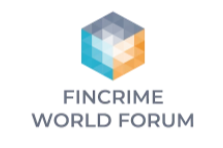
Economic Crime: From Conception to Response
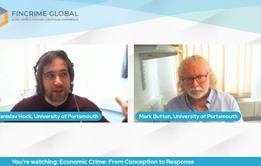
Join Prof Mark Button and Dr Branislav Hock, authors of the newly published book: ‘Economic Crime: From Conception to Response’ for a discussion and a reflection on the most important problems associated with economic crime.
 Currently
reading
Currently
reading
Economic Crime: From Conception to Response
- 2
- 3

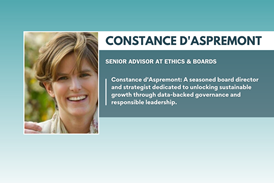
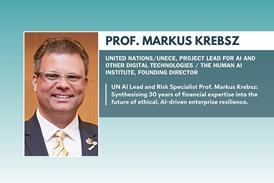
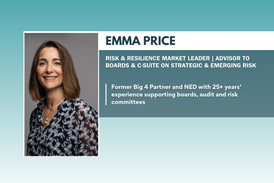



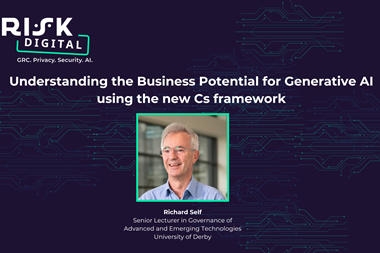
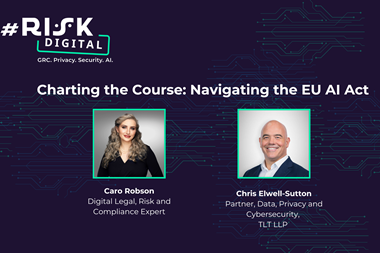
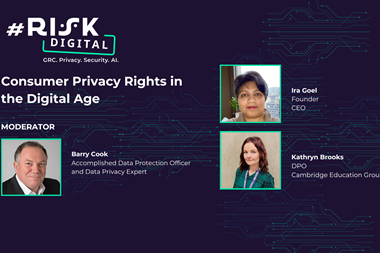
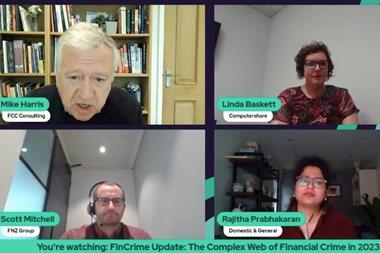
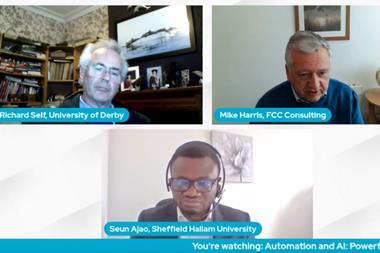


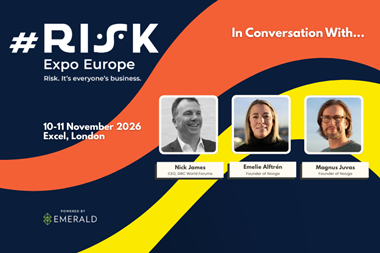




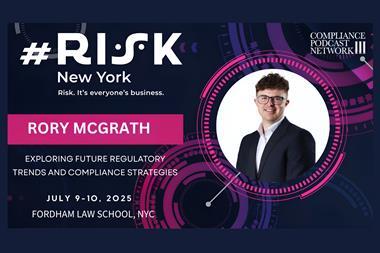







No comments yet